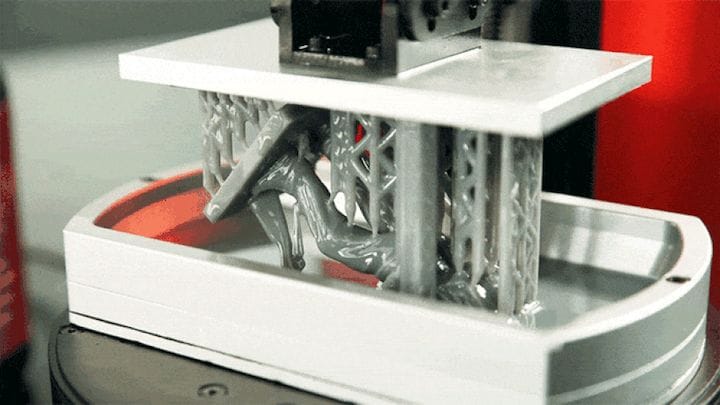![The new SparkMaker SLA 3D printer in action [Source: WOW!]](https://fabbaloo.com/wp-content/uploads/2020/05/sparkmaker-fhd-ov_result_img_5eb0a7fa10d8e.jpg)
Though 3D printing is imperative for many hardware developers, it’s usually the price of the printer that stops a lot of folks from purchasing their own—as opposed to using an office 3D printer or a 3D printing service.
After all, a half-decent desktop 3D printer capable of keeping your tolerances tight can cost well over a thousand dollars.
It’s this fine line between affordability and quality of printing that the SparkMaker FHD walks. After its first successful Kickstarter campaign, the SparkMaker FHD is trying to one-up its predecessor by adding a 1080 LCD screen and four new resin types to make printing easier and versatile.
The new SparkMaker has Bluetooth connectivity as well as an SD card slot. This gives you a lot more options when you want to use someone else’s printer or when you’re just too lazy to open your computer. To save even more time, you can use the SparkMaker mobile app to control your prints using your smartphone or tablet.
![Design of the SparkMaker FHD SLA 3D printer [Source: WOW!]](https://fabbaloo.com/wp-content/uploads/2020/05/image-asset_img_5eb0a7fa73aa9.jpg)
One of the more significant highlights of the FHD model is the high definition LCD screen. You won’t be watching full-length movies on it, though. The screen is for printing more massive objects up to 61.8 x 110 x 125 mm at a higher quality and speed. The quality of the prints have a 57 μm XY axis resolution and can print as fast as 25mm/hr.
This brings us to the four new resin types. To handle different 3D printing needs, each resin has its own unique characteristics which make it ideal for printing specific types of objects.
![LCD-Q resin 3D prints by the SparkMaker FHD SLA 3D Printer [Source: WOW!]](https://fabbaloo.com/wp-content/uploads/2020/05/image-asset_img_5eb0a7fae28a6.gif)
LCD-Q is a resin made for printing objects in a variety of different colors. This one has a tensile rate of 5% and a hardness of 80D.
![LCD-MG resin 3D prints by the SparkMaker FHD SLA 3D Printer [Source: WOW!]](https://fabbaloo.com/wp-content/uploads/2020/05/image-asset_img_5eb0a7fb4d6ed.gif)
LCD-MG is the hardest of the bunch as it turns rock solid a few minutes after printing, making it ideal for printing more functional parts. It has a tensile rate of 5% and a hardness of 80D.
![LCD-Q resin 3D prints by the SparkMaker FHD SLA 3D Printer [Source: WOW!]](https://fabbaloo.com/wp-content/uploads/2020/05/image-asset_img_5eb0a7fb98563.jpg)
LCD-G is the clearest resin, allowing for some slick engravings on a resin which won’t turn yellow over time. You’d want to use this when fossilizing small relics or mementos. Having the highest tensile rate of the bunch (25%), this resin has a hardness of 75D.
Read the rest at SolidSmack.com











A research thesis details the incredibly complex world of volumetric 3D printing. We review the highlights.